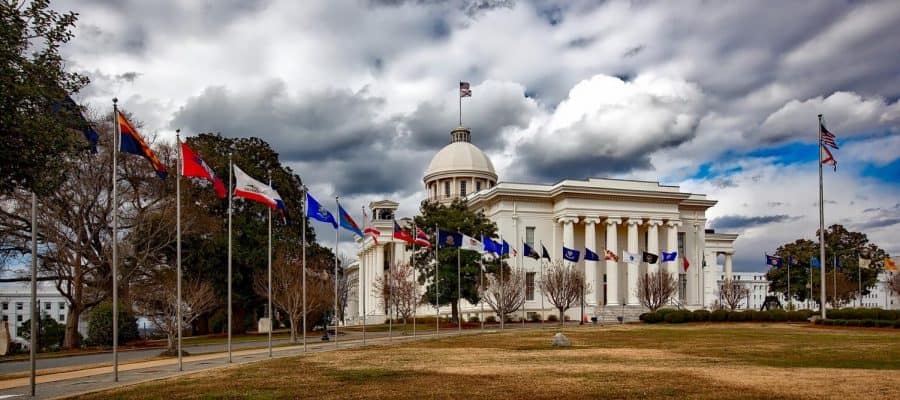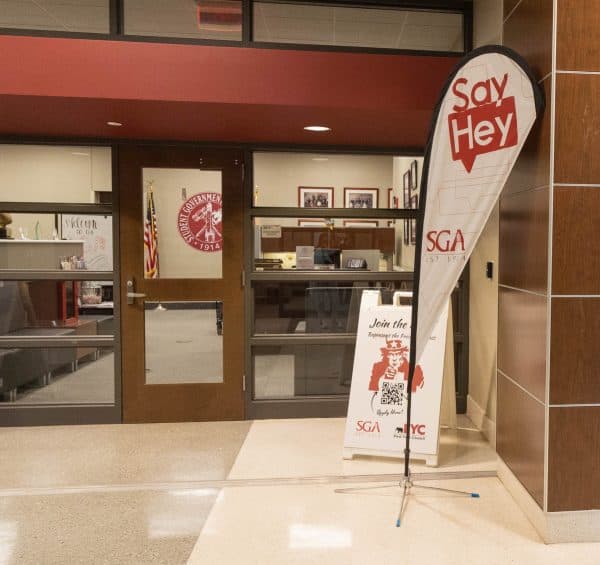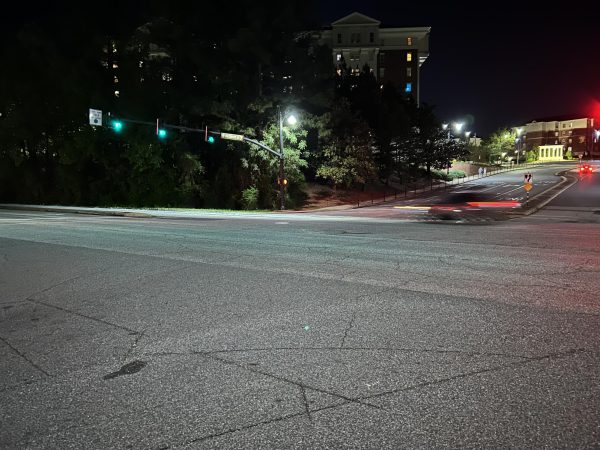Decoding HB 498: What you need to know about Alabama’s new free speech bill
As the state joins a nationwide push toward limiting free speech regulations, a new bill may change the way the University of Alabama handles controversial speakers on campus.
July 16, 2019
On June 6, Gov. Kay Ivey signed HB 498 into law, requiring public universities in Alabama to adopt policies protecting campus free speech. This legislation addresses several issues surrounding free speech on public universities, specifically citing university officials’ ability to cancel campus speakers and the establishment of free speech zones.
“Freedom of expression is critically important during the education experience of students, and each public institution of higher education should ensure free, robust, and uninhibited debate and deliberation by students,” the law states.
The Republican-sponsored bill comes after President Donald Trump signed an executive order requiring colleges to promote free speech or risk losing federal research funds, and Alabama is one of several states that have followed suit.
FREE SPEECH AT UA
The University of Alabama has experienced the debate of free speech on public universities firsthand.
In the spring of 2018, an event held at the University featuring a white nationalist speaker was canceled, and the student group hosting the event had its status as a campus organization withdrawn. Jared Taylor, editor of the online “American Renaissance” website, was invited by the student group Students for America First. He was scheduled to give a talk titled “Diversity: Is it Good for America?” After receiving backlash from students, and even some campus officials, the group dissolved – but only because their advisor had quit.
In the spring of 2019, tensions rose again when political commentator Ben Shapiro spoke on campus, though the ensuing debate on free speech was more directly targeted at the student group, UA Young Americans for Freedom, than the University itself.
[Read: Ben Shapiro isn’t worth your money, Rebuttal: Ben Shapiro is worth your money, and Allow student media outlets to cover events]
In both cases, the University did not take prohibitive action unless the group itself was violating protocols required of all student organizations.
Now signed into law, HB 498 will be implemented in July 2020. The law creates several new regulations for universities to comply with, specifically dealing with invitations to speakers and organizations and the creation of free speech zones on campus.
Abolishing free speech zones
Free speech zones allow students, administrators, faculty and staff to assemble, speak, distribute literature and state their opinions in specific areas, which are usually outdoor areas of the campus. Critics of free speech zones say that the practice squelches free speech by confining it to certain areas. Currently, the University does not have free speech zones.
[Read: Students hold free speech forum]
This law will disestablish free speech zones and instead focus on protecting free speech throughout the entire campus. Because all outdoor areas of campus are now protected for free speech, the bill also prohibits public universities in Alabama from creating free speech zones.
Prohibiting fee adjustments and disinvitations
The law will also prohibit campuses from adjusting security fees of invited guests who may receive backlash for “ideas and opinions the individuals may find unwelcome, disagreeable, or offensive,” as well as prohibit university officials from disinviting those guests.
HB 498 states that disrupting any event in a way that infringes on a person’s ability to listen to a speaker is strictly prohibited. Although there are no specific consequences to public universities for not complying, the law states that the attorney general and those whose rights were allegedly violated could pursue legal action.
Protection against disruptive material
Although HB 498 outlines protection for speaking one’s opinions freely, it does not safeguard all types of speech. Section 3, article 6 states,
“The public institution of higher education shall not permit members of the campus community to engage in conduct that materially and substantially disrupts another person’s expressive activity or infringes on the rights of others to engage in or listen to expressive activity and shall adopt a range of disciplinary sanctions for anyone under the jurisdiction of the institution who materially and substantially disrupts the free expression of others.”
The bill also recommends punishments for organizations that fail to comply with the conditions of material that is deemed substantially disruptive. Section 4 states,
“It is the sense of the Legislature that if a member of the campus community has twice been determined to have materially and substantially disrupted the expressive rights of others as provided for in this act, a minimum punishment of a one-term suspension during the regular school year will in most cases be appropriate. If a lesser punishment than a one-term suspension is issued upon a second such offense, the institution shall submit an explanation in writing to the Committee on Free Expression within two weeks of the determination to impose the lesser punishment.”
A NATIONWIDE TREND
The push for further protection of campus free speech has been a trend nationwide, as universities have dealt with backlash for campus speakers and events. Petitions and protests aimed at preventing events have sometimes led universities to revoke invitations to the often politically polarizing, radically religious or controversial individuals or organizations receiving the backlash.
“Free speech is the cornerstone of our rights as American citizens — and those First Amendment rights certainly apply to college students on university campuses,” said the bill’s sponsor, Rep. Matt Fridy (R-Montevallo) in an article published by AL.com. “With this law, we are making it very clear that in Alabama, the First Amendment rights of all students, liberal or conservative, will be protected from unfair and discriminatory university speech policies.”
Several states around the nation have passed similar legislation aimed at protecting free speech on public universities. Missouri, Arizona, Virginia, Utah, Colorado, Tennessee, Lousianna, North Carolina and Georgia are a few examples of other states confronting this same issue.
And, recently, this legislation has turned federal. On March 11, Rep. Francis Rooney (R-Florida) introduced HR 1672, known as the “Free Right to Expression in Education Act.” This bill would prohibit free speech zones in all public universities in the United States, federally mandating stricter protections of free speech that are currently in discussion in states across the nation.
But, not everyone is convinced that stricter protection of freedom of speech is a good thing.
STUDENT OPINIONS
Opponents of the bill argue that these new regulations will protect radical, potentially racist speakers who are invited to universities through campus clubs and organizations, and the consequences could be violent.
The protests that have taken place in the past against controversial speakers or organizations invited to campuses across the nation are direct examples of these safety concerns. Many opponents of the bill believe that college administrators should have the ability to decide who or what is allowed to accept invitations to their institutions.
Rep. Napoleon Bracy (D-Mobile) was an opposer of the bill, saying that the safety of students should be a top priority of all university officials. He and other opponents are concerned that certain speakers or events could elicit violent responses in some students.
While some students have argued for more restrictions, others have claimed that the current practice of university officials dictating who or what is invited to campus is unfair treatment and goes against their rights to self expression and freedom of speech.
“Eagerly granting government power over the speech of its citizens is beginning the descent on a sharp, slippery slope towards oppression and despotism,” wrote Nicolas Briscoe in an opinion column published on The Crimson White in 2017. “Each law that chips away at our most closely held civil liberties, no matter how opposed you might be to the application of the liberty in question, is an unacceptable affront to the foundation of our republic and the inalienable rights that emanate thereof.”
In 2018, the University received a “yellow-light” rating from the Foundation for Individual Rights in Education (FIRE), which flagged its sexual misconduct policy, event planning, harassment and advertisement policies for restricting “constitutionally protected speech.” Several students and faculty, however, have contested FIRE’s findings.
“When we have something that’s dealing with free speech, you actually do want it to be what we call content neutral. That means the language is going to be somewhat vague,” said Dianne Bragg, an associate professor in the UA Department of Journalism and Creative Media. “So, I would say that this particular bill interestingly doesn’t really mention the type of speech within the bill. That language is not in the bill; it’s left open. They focused on the free speech zones, but we don’t have that here. I do believe that our restrictions for speakers have fallen under what we would call content neutral.”
Parts of the bill that may affect campuses most are those that prohibit increasing security fines to organizations. If security is increased due to campus backlash, that funding cannot fall on the organization or the speaker, instead falling under the responsibility of the university. In October 2017, Richard Spencer spoke to students of the University of Florida, and security costs passed $500,000.
“The state’s also going to have to understand that people are going to have to step up,” Bragg said. “There are a lot of questions about how to implement this. The restrictions have been content neutral, and I know that a lot of universities have felt that they’ve been enforced that way. Where it’s very vague is how you implement something like this. The universities are left holding the ball, balancing the safety of their students with their desire for free speech. The bill that was passed doesn’t really address that, so it will be interesting to see what comes up and how the universities respond.”











